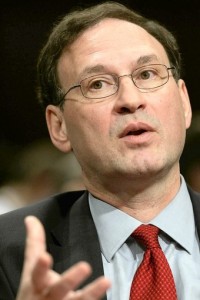法官隐私在他们的第一个判决坚决决定政府使用数字技术来监测人.
通过与David G. 野蛮人, 华盛顿局
一月 24, 2012
华盛顿报道
最高法院面临的第一次政府越来越多地使用数字技术来监测和美国人赞成隐私权坚决排除.
法院认为宪法一般从跟踪一个人附在汽车上的GPS设备禁止警察除非他们事先发出从法官手令. 但判决可能会限制一个主机设备,包括监控摄像机和手机跟踪, 法律专家表示,.
“我猜想每中美. 在国家检察官办公室将有一个会议,梳理一下这意味着他们正在进行的调查,” 说利奥尔Strahilevitz, 芝加哥大学的专家对隐私和技术.
甚至谁最经常与检察官一边法官拒绝了政府的观点,即美国人驾车在公共街道上已经放弃了他们的隐私权,并且可以跟踪和监视的意愿. 至少有五名法官倾向于出现, 在未来, 大大超越涉及把一个GPS设备在汽车的物理入侵和统治,几乎任何一个技术设备的长期监测,可能会侵犯个人私隐权.
到目前为止, 检察官和警察都相信,只要他们被跟踪的人谁是在公众场合, 他们可以使用GPS装置, 手机追踪, 面部识别相机或计算机数据挖掘,搜集有关个人档案材料,没有搜查证. 大多数法官的积极拒绝了这一想法星期一.
虽然法官同意的结果, 他们争吵了如何处理这个问题,并能走多远.
五名法官, 为首的安东宁斯卡利亚, 说,警方违反第四修正案的禁止不合理的搜查,当他们连接设备到车辆的保险杠和监控其运动.
大法官塞缪尔一. 阿利托小, 其意见也加入了其他三人, 引 “戏剧性的技术变革” 这使得它 “相对容易和廉价” 代理商暗中监视人,并收集大量的信息. 法官索尼娅·索托马约尔同意, 说 “认识到,政府可能会看寒战” 自由.
无意见对搜索设置了严格的限制, 但他们暗示法院被确定为限制官员’ 电力监控个人, 至少当不存在 “可能的原因” 相信个人都犯了罪.
在法庭的情况出现了,当安托万·琼斯被控在华盛顿地区运行的毒品交易操作, 部分基于从跟踪他的吉普车收集的数据.
由 9-0 投票, 法官裁定为违宪,警方的一个小的GPS设备连接到他的保险杠和跟踪他的车一个月. 跟踪数据有助于定罪运行的毒品交易操作琼斯.
这是罕见的,当毒品刑事胜在保守倾向的高球场, but the GPS case concerned whether the modern state had unlimited power to track and monitor its citizens, evoking the specter of George Orwell’s “1984.”
“Society’s expectation has been that law enforcement agents and others would not — and indeed, in the main, simply could not — secretly monitor and catalog every single movement of an individual’s car for a very long period,” 阿利托说, adding that such a search “surely crossed” the constitutional line. Justices Ruth Bader Ginsburg, Stephen G. Breyer and Elena Kagan agreed with Alito.
Sotomayor joined Scalia’s majority opinion, but in a concurring opinion she made clear that she also agreed with much of Alito’s broader view that the court must limit the government’s use of tracking technology.
斯卡利亚的观点保护 “宪法最小” 政府可能不会对私有财产擅闯, 她写道:. 但她说,这些设备可能 “使可在一个相对较低的成本约任何人谁是政府的亲密信息,例如大幅量子, 在其不受约束的自由裁量权, 选择跟踪。” 此外, 她说:, “政府可以存储这些记录和有效地挖掘他们的信息,年后的未来。” 政府不能随意使用 “所以经得起滥用的工具,” 她说:, 特别是在光的第四修正案的目的 “遏制警察权力的任意演习。”
斯卡利亚没有取消抵押品赎回权通过跟踪未来的决定 “电子方式” 是 “违宪侵犯隐私,” 但说有 “没有理由向前冲” 现在要解决的问题. 终审法院首席法官约翰G. 罗伯茨Jr.and大法官安东尼·M. Kennedyand克拉伦斯·托马斯也加入了看法.
在中美的裁决. 与. 琼斯留下许多疑点. 阿利托和索托马约尔没有说什么时候电子跟踪走得太远.
隐私专家誉为认为作为一个惊喜和一个良好的预兆未来.
这是 “在应用第四修正案的保护,在监测技术的进步具有里程碑意义的裁决,” 说,华盛顿的律师安德鲁·平卡斯. 它也 “一个显著斥责政府,” 它争辩说,没有隐私的权利受到威胁.
民主中心的格雷戈里Nojeim & 科技同意, 说法院 “明确表示,不会允许推进技术蚕食隐私权的宪法权利。” 这一决定可能会利用手机来跟踪人警察限制, 他说:, 因为 “cellphone triangulation can be just as precise as GPS.”
Strahilevitz said the court’s opinion was most important for its rethinking of the right to privacy when balanced against public surveillance.
“Before today, if you asked whether the 4th Amendment puts some limit on the government’s use of facial recognition cameras in the Chicago Loop or at the Los Angeles airport, you would say no. You had no expectation of privacy. After today, it is not so clear. The court said there is an expectation of privacy in public, and they see a danger in using technology to compile dossiers on persons.”
The case also featured an unusual clash between Scalia and Alito over how to interpret the Constitution. Scalia relied on its original history and said the 4th Amendment was about protecting private property from official searches. Alito derided his focus on “18th century tort law” and said the court needed to protect citizens against “unreasonable searches” more broadly.
Scalia’s opinion, if strictly followed, could limit the reach of the 4th Amendment, but Sotomayor agreed with Alito’s view that it also extended to protecting privacy broadly.
来源: 的. 时报



没有评论
提出的意见 最高法院说,警方需要保证的GPS跟踪 目前已经结束.